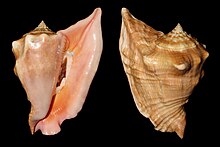Lobatus peruvianus, commonly known as the Peruvian conch or the cock's comb conch, is a species of large sea snail, a marine gastropod mollusk in the family Strombidae, the true conchs and their allies.[2]
| Lobatus peruvianus | |
|---|---|

| |
| Apertural (left) and abapertural (right) views of a shell of Lobatus peruvianus | |
| Scientific classification | |
| Domain: | Eukaryota |
| Kingdom: | Animalia |
| Phylum: | Mollusca |
| Class: | Gastropoda |
| Subclass: | Caenogastropoda |
| Order: | Littorinimorpha |
| Family: | Strombidae |
| Genus: | Lobatus |
| Species: | L. peruvianus
|
| Binomial name | |
| Lobatus peruvianus (Swainson, 1823)
| |
| Synonyms[1] | |
Distribution
editLobatus peruvianus occurs along the benthic tropical coastal waters of the Eastern Pacific Ocean. Their distribution stretches across various countries and regions including the Gulf of California, Mexico, Pacific Panama, Nicaragua, Costa Rica, Ecuador, and Peru. These Peruvian Conchs are sand dwellers and are found in depths up to 130 feet.[3]
Description
editThe shell of Lobatus peruvianus is large, ranging from 60–210 millimetres (2.4–8.3 in). It was originally described by William Swainson in 1823, with him stating that the shell is "heavy, with a depressed spire, and a prominent tip". Like other species in the same genus, Lobatus peruvianus's outer lip is very pronounced and ornamental. The outside color of the shell falls into the tan and light brown range, sometimes also pink; while both the inner and outer lips are cream, pink, or white.[4] While not much information is available regarding the Peruvian conch specifically, similar species in the same Genus have life spans of up to 40 years; while the majority live between 10 and 30 years.[5]
Behavior
editSimilar to other animals in the family Strombidae, Lobatus peruvianus moves around by using their muscular foot that sinks like a claw into the sand to exert force and move forward. This behavior is also beneficial in terms of predator avoidance. It causes the conch's chemical trail to be scattered and inconsistent therefore confusing predators.[6] Similar to other conchs in the family Strombidae, Peruvian conchs can take around 5 years to reach maturity and are therefore very slow-growing creatures.[7]
Diet
editThis species is an algivore, which means that its diet mostly consists of algae. It locates food by scrounging over the sea-floor.[8] Since strombids are shallow sand dwellers, they move along the sea-floor finding algae that live in shallow waters. They may also occasionally feed on detritus.[9]
Human Uses
editLobatus peruvianus is a major source of protein for many groups along the Pacific coast. Besides the subsistence use of these conchs, their shell provides many uses. Due to its color and intricate form, people have been attracted to the shell of the Lobatus peruvianus. Peruvians used the shell to create trumpets; which was possible due to the substantial opening at the top of the shell from which the sound is amplified from. [10]
Conchs are vulnerable to overfishing due to their slow growth rates and late mating tendencies; because of this, it is illegal or frowned upon to harvest these types of conch.[11]
References
edit- ^ Lobatus peruvianus (Swainson, 1823). WoRMS (2013). Lobatus peruvianus (Swainson, 1823). Accessed through: World Register of Marine Speciesathttp://www.marinespecies.org/aphia.php?p=taxdetails&id=531665 on 6 December 2013 .
- ^ Senchenberg; Krupp, F.; Schneider, W.; Sommer, C.; Carpenter, K. E.; Niem, V. H. (1995). Guia FAO para la identificación de especies para los fines de la pesca (in Spanish). Vol. 1. Rome: Organización de las Naciones Unidas para la Agricultura y la Alimentación. p. 283. ISBN 92-5-303408-4.
- ^ "Peruvian Conch". Mexico - Fish, Birds, Crabs, Marine Life, Shells and Terrestrial Life. 11 May 2017. Retrieved 12 April 2020.
- ^ "Gastropoda Stromboidea | Species / Lobatus Peruvianus". stromboidea.de. Retrieved 12 April 2020.
- ^ "Queen Conch – Detail Page | DCNA". Retrieved 12 April 2020.
- ^ Berg (July 1975). "Behavior and Ecology of Conch (Superfamily Strombacea) on a Deep Subtidal Algal Plain". ingentaconnect.com. Retrieved 12 April 2020.
- ^ "Community Conch". Community Conch. Retrieved 13 April 2020.
- ^ "Lobatus peruvianus (Swainson 1823) - Encyclopedia of Life". eol.org. Retrieved 12 April 2020.
- ^ Latiolais J. M., Taylor M. S., Roy K. & Hellberg M. E. (2006). "A molecular phylogenetic analysis of strombid gastropod morphological diversity". Molecular Phylogenetics and Evolution 41: 436-444. doi:10.1016/j.ympev.2006.05.027. PDF.
- ^ Mazza, Giuseppe (7 August 2008). "Lobatus peruvianus". Monaco Nature Encyclopedia. Retrieved 12 April 2020.
- ^ "Community Conch". Community Conch. Retrieved 13 April 2020.